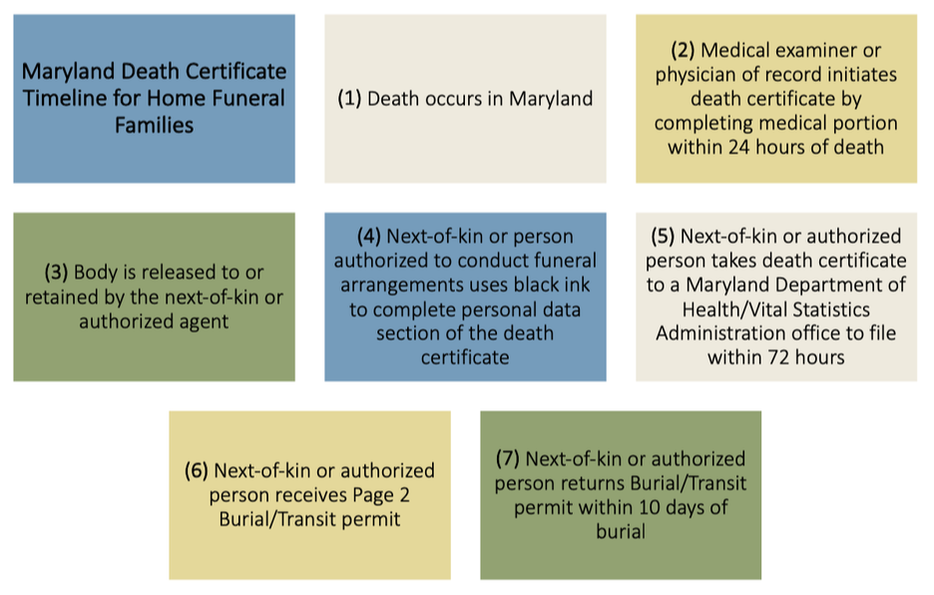Recommendations for Completing Paperwork
|
On This Page
|
Completing the Death Certificate

Home Funerals Led by Next-of-Kin
Families in Maryland may care for their own dead from death to disposition (Maryland Statute § 4-201). Immediate family members of the deceased are not prohibited from providing for the care, preparation, or disposition of human dead bodies. Embalming is primarily a cosmetic procedure and is not required by law. This includes cleansing, dressing, and casketing or shrouding in the home; sheltering in place in the home; filing the death certificate through the Maryland Department of Health/Vital Statistics Administration; transporting the deceased; making arrangements for burial; burying on private property; or making arrangements to cremate (crematories may require a funeral director to make the call).
Obtaining and Filling Out the Death Certificate:
Getting the Death Certificate Signed by a Medical Authority
If the body must be moved from a hospital, hospice, care facility, or medical examiner’s office, a required form must be obtained from the facility before removal. These institutions may have their own policies regarding body removal protocol, so check as well in advance as possible to ensure a smooth transition from institutional care.
Filing the Death Certificate and Obtaining Burial/Transit Permit
While there are precise steps for completing paperwork without hiring a funeral director, they are, in most cases, no more daunting than any other form filing. The information required for the demographic portion is personal individual and family history, all of which will have to be located by the family anyway and then conveyed to a funeral director if the family chooses to hire one to fill it in for them. There is no cost to filing by families.
Steps regarding death certificates and disposition transit permits:
Burial/Transit Permit
A burial/transit permit is needed prior to disposition and when the body will be moved out of state. It is part of the death certificate and must be detached. Make a copy for your records.
Authorization to Cremate
In Maryland, there is a 12 hour mandatory waiting period between the death and the cremation. Cremations must be authorized by a Medical Examiner.
Conducting Body Care
Tips:
Families in Maryland may care for their own dead from death to disposition (Maryland Statute § 4-201). Immediate family members of the deceased are not prohibited from providing for the care, preparation, or disposition of human dead bodies. Embalming is primarily a cosmetic procedure and is not required by law. This includes cleansing, dressing, and casketing or shrouding in the home; sheltering in place in the home; filing the death certificate through the Maryland Department of Health/Vital Statistics Administration; transporting the deceased; making arrangements for burial; burying on private property; or making arrangements to cremate (crematories may require a funeral director to make the call).
Obtaining and Filling Out the Death Certificate:
- A completed and signed death certificate must be obtained from the physician, hospice nurse, medical examiner, attending physician, and/or other qualified authority who pronounces the death and authorizes cause of death on the medical portion of the death certificate within 24 hours;
- A blank form may also be obtained from the Maryland Department of Health/Vital Statistics Administration or the Department of Mental Health and Hygiene, Division of Vital Statistics Administration;
- The next-of-kin or designated agent completes the demographic portion;
- If a funeral director is hired, he or she will complete the demographic portion using information provided by the family;
- The next-of-kin or the designated agent, if acting as the funeral director, will sign as the funeral director where is says "Funeral Service Licensee";
- The form must be filled out as specified, with no cross-outs or white-outs;
- Every box must be completed, including NA or N/A;
- Obtain a certified copy of the death certificate for use in obtaining a disposition transit permit for completing the final disposition or for moving the deceased out of state.
Getting the Death Certificate Signed by a Medical Authority
- Physicians and medical examiners must certify the medical portion of the death certificate within 24 hours of the death. It is up to the filing party to locate and obtain that signature if the death certificate is initiated by a different authority.
- Families of patients who have been on hospice service may be assisted by the attending hospice nurse in locating and obtaining the physician's signature.
- A Note About Unattended Deaths: If the person is not on hospice service but death outside a medical setting is anticipated, the likelihood of a death investigation can be reduced by contacting the primary care provider in advance to confirm their ability to certify the death based on known health conditions.
If the body must be moved from a hospital, hospice, care facility, or medical examiner’s office, a required form must be obtained from the facility before removal. These institutions may have their own policies regarding body removal protocol, so check as well in advance as possible to ensure a smooth transition from institutional care.
Filing the Death Certificate and Obtaining Burial/Transit Permit
While there are precise steps for completing paperwork without hiring a funeral director, they are, in most cases, no more daunting than any other form filing. The information required for the demographic portion is personal individual and family history, all of which will have to be located by the family anyway and then conveyed to a funeral director if the family chooses to hire one to fill it in for them. There is no cost to filing by families.
Steps regarding death certificates and disposition transit permits:
- Acquire the death certificate from the medical authority or tribal law enforcement officer, with the medical portion completed and signed.
- Complete the demographic portion, no spaces left blank, signed by the next-of-kin or designated agent acting as his or her own funeral director.
- File the form with the Maryland Department of Health/Vital Statistics Administration within 72 hours of the death. Call ahead to ask about office hours, or to arrange for assistance outside of normal office hours if possible.
- Certified copies of the death certificate usually will be available for purchase from any Health Department office, sometimes immediately. The first certified copy costs $10; additional copies cost $12.
- Page two of the death certificate serves as the burial/transit permit. It must be signed by the physician of record or medical examiner.
- With the burial/transit permit, bodies may be moved, including taken across state lines with no additional permits required. If the body will be transported out-of-state for burial or cremation, be sure to call ahead to the out-of-state cemetery or crematory to check on any unique requirements, and to ensure they'll accept a body from a family.
- Return the completed burial/transit permit to the Department of Mental Health and Hygiene, Division of Vital Statistics Administration, within 10 days.
Burial/Transit Permit
A burial/transit permit is needed prior to disposition and when the body will be moved out of state. It is part of the death certificate and must be detached. Make a copy for your records.
Authorization to Cremate
In Maryland, there is a 12 hour mandatory waiting period between the death and the cremation. Cremations must be authorized by a Medical Examiner.
Conducting Body Care
- Bathe as desired to remove surface bacteria.
- Wrap or clothe as desired.
- Cool the body with the use of Techni-ice®, dry ice, air conditioning, opening a window in cool weather; 3 days under 65 degrees is sufficient under average circumstances.
- Use universal precautions (masks, gloves, handwashing) as needed for someone with a communicable disease (see Special Circumstances below for more info).
- Report any communicable diseases to the Maryland Center for Infectious Disease Surveillance and and Outbreak Response (See below for how to handle Special Circumstances.)
Tips:
- Plan ahead whenever possible by contacting or locating key players (Registrars, Deputized agents, Medical Examiners, cemetery or crematory operators, etc.) who may need to be involved
- Shop ahead for caskets, shrouds, urns, and other necessary goods
- Shop for a funeral director who will assist if necessary with the services you may choose to purchase
- Research additional information at the Funeral Consumers Alliance.
Special Circumstances
Special Circumstances for Home Funerals
Deaths Involving Communicable Diseases
If you've been caring for someone with a communicable disease such as Hepatitis or AIDS, the same precautions (latex gloves, for example) you took during the care apply after death. No extraordinary measures are necessary. If death occurs from a rarer infectious disease such as meningitis or a tropical fever, you should consult the Maryland Center for Infectious Disease Surveillance and and Outbreak Response. Immediate burial or direct cremation may be recommended in such cases. Embalming is not required in any circumstances.
Deaths Involving Medical Examiners
Cremation certificates must be issued by a medical examiner or deputy. To locate a deputy near you, go to your Maryland Office the Chief Medical Examiner.
In the case of unanticipated death, the Medical Examiner’s office will be contacted to determine cause of death. It is up to the ME to determine the need for an autopsy. If you are choosing to bring the body back home after the ME releases the body, be sure he or she knows of your intentions. While the body may be temporarily in the custody of the ME, when released the family again has full custody and control of the body.
Deaths Involving Organ Donation
Home funerals are possible at the end of organ donation harvesting. Ask the medical team what to expect and what special precautions or protocols they recommend, if any. For more information on organ donation in general, research Arrange Disposition for a list of possible donor organizations.
Fetal Death and Miscarriage
Fetal deaths must be reported when the death occurs at 20 or more weeks of gestation or when the weight is 500 grams or more. Reports are sent directly to the Health Department by the physician, hospital, or clinic if a procedure was performed. Parents are entitled to conduct home funerals and choose dispositions of burial or cremation the same as birthed children. Fetal death reports are required in Maryland when the fetus is being transported from the place of delivery to final disposition.
Deaths Involving Communicable Diseases
If you've been caring for someone with a communicable disease such as Hepatitis or AIDS, the same precautions (latex gloves, for example) you took during the care apply after death. No extraordinary measures are necessary. If death occurs from a rarer infectious disease such as meningitis or a tropical fever, you should consult the Maryland Center for Infectious Disease Surveillance and and Outbreak Response. Immediate burial or direct cremation may be recommended in such cases. Embalming is not required in any circumstances.
Deaths Involving Medical Examiners
Cremation certificates must be issued by a medical examiner or deputy. To locate a deputy near you, go to your Maryland Office the Chief Medical Examiner.
In the case of unanticipated death, the Medical Examiner’s office will be contacted to determine cause of death. It is up to the ME to determine the need for an autopsy. If you are choosing to bring the body back home after the ME releases the body, be sure he or she knows of your intentions. While the body may be temporarily in the custody of the ME, when released the family again has full custody and control of the body.
Deaths Involving Organ Donation
Home funerals are possible at the end of organ donation harvesting. Ask the medical team what to expect and what special precautions or protocols they recommend, if any. For more information on organ donation in general, research Arrange Disposition for a list of possible donor organizations.
Fetal Death and Miscarriage
Fetal deaths must be reported when the death occurs at 20 or more weeks of gestation or when the weight is 500 grams or more. Reports are sent directly to the Health Department by the physician, hospital, or clinic if a procedure was performed. Parents are entitled to conduct home funerals and choose dispositions of burial or cremation the same as birthed children. Fetal death reports are required in Maryland when the fetus is being transported from the place of delivery to final disposition.
Authority to Make Arrangements
Recommendations:
The next-of-kin or a designated agent have the right to handle all aspects of after-death care. This means that families can legally care for and transport a body, keep it in their home for a viewing period, and take it for burial themselves, without hiring a licensed funeral director, except for any details the family wishes to have done by a funeral home or to arrange a cremation.
According to Maryland law, the authority to make all arrangements follows this order:
The Maryland Advance Directive Form includes a section to identify a person make decisions about funeral arrangements (Page 20, Maryland Advance Directive.) Individuals choosing to have someone who is not a family member or a professional funeral director must do so in writing and have it witnessed on this or another state law compliant form prior to death (Maryland Code, Health Occupations, § 7-410(b). You can also find language approved for this use in Maryland Code §5–603. For comprehensive explanation of completing advance directives in Maryland, go to the Maryland attorney General's site Advance Directives.
- Complete and file all advance directives, including Living Will and Durable Power of Attorney for Health Care (DPOAH).
- Assign a family member, friend, or other designated agent to carry out all funeral arrangements.
The next-of-kin or a designated agent have the right to handle all aspects of after-death care. This means that families can legally care for and transport a body, keep it in their home for a viewing period, and take it for burial themselves, without hiring a licensed funeral director, except for any details the family wishes to have done by a funeral home or to arrange a cremation.
According to Maryland law, the authority to make all arrangements follows this order:
- An authorized [also called Designated] agent
- The surviving spouse or domestic partner
- An adult child
- A parent
- An adult sibling
- An adult grandchild
- An appointed guardian
- Any person willing to assume the responsibility
- Any adult child, parent, adult brother or sister, or adult grandchild of the decedent who confirms in writing to a licensee that all of the other members of the same class have been notified may serve as the authorizing agent unless the licensee receives a written objection from another member of that class within 24 hours
- If there is no spouse and there are multiple adult children, a majority opinion will be sufficient to make a decision.
The Maryland Advance Directive Form includes a section to identify a person make decisions about funeral arrangements (Page 20, Maryland Advance Directive.) Individuals choosing to have someone who is not a family member or a professional funeral director must do so in writing and have it witnessed on this or another state law compliant form prior to death (Maryland Code, Health Occupations, § 7-410(b). You can also find language approved for this use in Maryland Code §5–603. For comprehensive explanation of completing advance directives in Maryland, go to the Maryland attorney General's site Advance Directives.
Obtaining Official Copies of the Death Certificate
Once the death certificate is electronically filed, certified copies may be obtained at any Maryland Department of Health/Vital Statistics Administration or Maryland Department of Health and Mental Hygiene, Vital Statistics Administration office throughout the state. Certified copies may be needed to settle the affairs of the deceased (for example, for insurance or benefit claims, to close accounts). The first certified copy costs $10; additional copies cost $12.
Notifications and Benefits
Newspapers
Families may file obituaries and memorial notices. A newspaper may ask to see a death certificate and many newspapers charge a fee for publishing an obituary.
Military and Veterans Benefits
Contact the Department of Veterans Affairs for information on benefits, or visit http://www.cem.va.gov/ for online information. Among other things, you may be entitled to a U.S. flag from the Post Office, to be used at a memorial service, by presenting a certified copy of the death certificate and proof of military service. You may also qualify for a free gravesite in a VA cemetery. Toll-free: 800-827-1000.
Social Security Benefits
To obtain Social Security Administration information, go to http://www.socialsecurity.gov/
Check out http://www.funeralwise.com/learn/arrange/benefits for more info on Social Security and VA benefits.
Families may file obituaries and memorial notices. A newspaper may ask to see a death certificate and many newspapers charge a fee for publishing an obituary.
Military and Veterans Benefits
Contact the Department of Veterans Affairs for information on benefits, or visit http://www.cem.va.gov/ for online information. Among other things, you may be entitled to a U.S. flag from the Post Office, to be used at a memorial service, by presenting a certified copy of the death certificate and proof of military service. You may also qualify for a free gravesite in a VA cemetery. Toll-free: 800-827-1000.
Social Security Benefits
To obtain Social Security Administration information, go to http://www.socialsecurity.gov/
Check out http://www.funeralwise.com/learn/arrange/benefits for more info on Social Security and VA benefits.
Resources and Online Links
Maryland Funeral Resources and Education is a non-commercial public interest site dedicated to helping Maryland consumers care for their own dead with or without the assistance of a funeral director. All rights reserved © FuneralPartnership.org
|
Maryland Funeral Resources and Education
Website design Lee Webster,
SideEffects Publishing |

